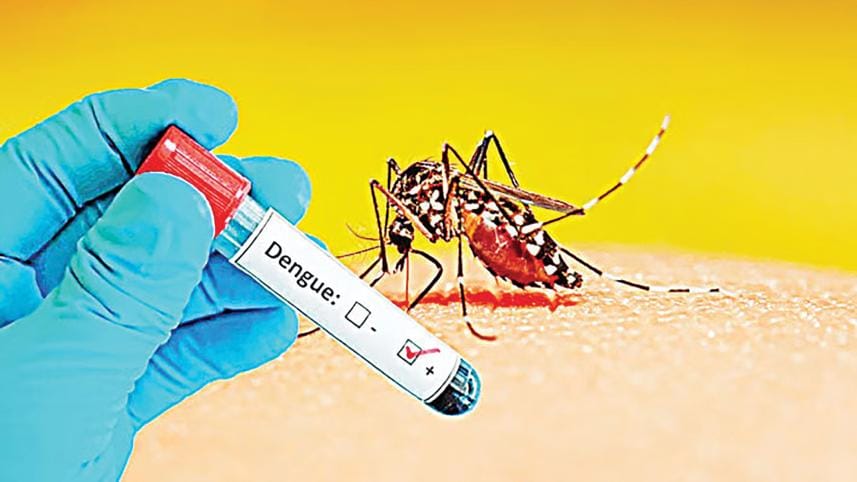Dengue cases see sharp rise in early July

At least 1,160 dengue patients were hospitalised in the first three days of July, compared to a total of 5,951 cases in June, painting an alarming picture of the outbreak.
According to the Directorate General of Health Services (DGHS), one more dengue patient died and 358 others were hospitalised in the 24 hours till yesterday morning.
With the latest deaths and cases, the total number of dengue infections this year has reached 11,456, while the death toll stands at 45, DGHS data shows.
In identified hotspots, we are providing all kinds of support. We are ready, but if dengue spreads further, it may become more challenging.
Amid the rising numbers, Prof Dr Sayedur Rahman, special assistant to the chief adviser for health ministry, warned that the situation could become more difficult if cases continue to rise.
He said the situation is still under control and the government is prepared to respond.
Dr Rahman made the remarks yesterday after a ceremony at the Directorate General of Health Services in Mohakhali, where China handed over a batch of "Dengue Combined Kits".
"In identified hotspots, we are providing all kinds of support. We are ready, but if dengue spreads further, it may become more challenging. If people follow our advice, the situation will remain manageable," he said.
Experts have stressed the need for immediate action nationwide, especially outside Dhaka, to curb the spread of Aedes mosquitoes, the dengue vector.
Entomologist Prof Kabirul Bashar said the government must prioritise larviciding and eliminating breeding grounds over general fogging, which he termed largely ineffective.
"Fogging should only be done in confirmed hotspot areas. The continued reliance on it is misguided," he said.
He recommended using Insect Growth Regulators (IGRs), which are effective for up to three months, alongside larvicides. He also urged people to clean and overturn water containers to prevent breeding.
Bashar emphasised the importance of public awareness. "Without community-level efforts to destroy breeding sites, dengue cannot be controlled," he said.
Warning that all 64 districts could face worse outbreaks than in previous years, Bashar said Aedes mosquitoes are now present across the country.
He called on the local government ministry to direct deputy commissioners, municipalities, and city corporations to urgently destroy mosquito larvae and breeding sites.
He also urged the ministry to supply IGRs or allow local bodies to procure and use them with proper guidance.
Entomologist GM Saifur Rahman echoed these concerns, saying the rapid growth of the Aedes population is driving a sharp rise in cases. "Once infected, mosquitoes can lay infected eggs, further worsening the outbreak," he said.
He called for a dedicated vector control department to scientifically manage mosquito-borne diseases. "Such a department should handle cluster identification, surveillance, and targeted interventions. Without a structured approach, current efforts will fall short," he warned.



 For all latest news, follow The Daily Star's Google News channel.
For all latest news, follow The Daily Star's Google News channel.
Comments